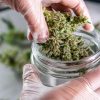The minimum age to purchase CBD products is determined by a number of factors, such as the laws in your country and the CBD product that you want to buy. In some places, 18 is the minimum age for purchasing CBD. Only a small amount of THC is present in hemp CBD products (the psychoactive component of cannabis). How old do you have to be to buy CBD : Some regions have more stringent regulations that require individuals to be at least 21 years of age to buy CBD. To ensure that you are in compliance with local laws and can legally purchase CBD products, it is important to be familiar with them and abide by their requirements.
Table of Contents
- How can you tell if a CBD-based product is good or not?
- What CBD is and what it isn’t
- CBD vs. THC: what’s the difference?
- What are cannabinoids?
- What is the effect of CBD on the body?
- What are the different forms of CBD?
- The Takeaway
How can you tell if a CBD-based product is good or not?
To determine the quality of a CBD-based product, you must carefully consider and evaluate it. Here are a few factors to consider:
- Look for products that have been subjected to independent laboratory testing. In addition to ensuring transparency, you will be able to verify the product’s contents, including the potency of CBD.
- CBD Source: Choose products that are derived from organically-grown hemp to reduce exposure to harmful substances such as pesticides.
- In order to preserve CBD purity without using harmful solvents, CO2 extraction is the preferred extraction method.
- In order to avoid psychoactive effects and comply with the law, reduce the THC content to less than 0.3%.
- Customer feedback and reviews: Look for customer reviews, positive reviews, and brand reputation to determine the overall satisfaction of the product.
Selecting a CBD product of high quality that suits your needs will be easier if you consider the factors listed above.
What CBD is and what it isn’t
Cannabis plants contain an organic substance called cannabidiol (CBD). As opposed to THC, it does not produce intoxication or psychoactive effects. CBD is used for its therapeutic potential but is not a cure or substitute for medical advice or treatment.
CBD extracts are derived from cannabis plants
CBD is extracted from cannabis plants that can be divided into hemp and marijuana. Hemp is a cannabis plant with a tetrahydrocannabinol content of 0.3 percent and less, while marijuana has a higher THC level. The term “marijuana”, which was once used to denigrate cannabis, is now considered controversial. Many in the cannabis industry prefer to use the term “cannabis.”
Hemp and cannabis are both members of the same plant species, which is why CBD can be found in some cannabis products. CBD does not have the psychoactive effects of THC (the main compound in marijuana responsible for the “high”), but it is still present. There is a possibility that CBD products contain traces of THC.
Hempseed oil and hemp extract are not the same thing.
Even though hempseed oil is derived from cannabis plants, it is different from CBD extract. Hempseed oils contain no THC and very little CBD. Rather than extracting the oil from the plants themselves, the oil comes from the seeds.
Hempseed oils were used in beauty products and cooking oils for many years before CBD became legal. CBD is not present in products that list Cannabis sativa oil or hempseed oil as an ingredient. You should look for CBD-rich extracts, including PCR (phytocannabinoid-rich hemp extracts), full-spectrum hemp, and hemp oil, when looking for CBD.
Has CBD
* Hemp oil
* Cannabidiol
* Full-spectrum hemp
* PCR (phytocannabinoid-rich) or PCR hemp extracts
Doesn’t have CBD
* Cannabis sativa oil
* Hempseed oil
CBD vs. THC: what’s the difference?
THC (tetrahydrocannabinol) and CBD (cannabidiol) are the psychoactive compounds found in cannabis plants. They have different effects. THC is psychoactive, and it produces a “high”, while CBD does not produce euphoria and is not intoxicating. CBD is used to treat potential medical conditions, while THC tends to be sought out for recreational use.
What are cannabinoids?
Cannabis contains chemical compounds called cannabinoids. They influence various physiological processes by interacting with receptors within the endocannabinoid systems of the body. It is well-known that cannabinoids include THC (tetrahydrocannabinol) and CBD (cannabidiol). Cannabinoids are found in cannabis in more than 100 different types. Each has its own potential benefits and effects. These compounds are crucial to the therapeutic and recreational properties and medical research of cannabis products.
Types of CBD
- CBD-isolated products don’t contain any THC.
- CBD broad-spectrum products: Can contain other cannabinoids, but THC has been removed during processing.
- Other cannabinoids, as well as CBD and THC products.
What is the effect of CBD on the body?
CBD (cannabidiol), which is a derivative of hemp, affects the body through the endocannabinoid (ECS) system. The ECS is a complex network that includes receptors and neurotransmitters. The cannabinoid receptors in the body do not directly bind to CBD, but it affects them indirectly. Endocannabinoids, which are produced by the body, can be enhanced by it.
CBD is thought to have a multifaceted impact on the human body. It can help reduce pain, inflammation, anxiety, and depression, promote relaxation and sleep quality, and support overall wellbeing. Epilepsy sufferers may also benefit from CBD’s ability to reduce seizures.
Although the exact mechanisms of CBD action are not yet known, it is believed to modulate dopamine and serotonin receptors, affect immune responses, and release neurotransmitters. Various health conditions deserve more research before CBD’s potential benefits can be fully understood.
What are the different forms of CBD?
CBD comes in a variety of forms to suit different tastes and needs. Some of the most common forms of CBD are:
CBD Tinctures/Oil: CBD oil, a liquid extract concentrated in CBD, is taken sublingually under the tongue for rapid absorption.
CBD Capsules – These CBD-infused soft gels or capsules can be taken orally and are easy to dose.
CBD Topicals- These creams, lotions, and balms contain CBD that is intended for topical application.
CBD Edibles: CBD can be added to a variety of edible products, such as chocolates, candies, and gummies. This is a discreet and convenient way to consume CBD.
CBD Vapes – CBD-infused vape liquids or cartridges are heated up and inhaled with a vaporizer.
CBD Isolate (Crystallized CBD) – CBD is used to make CBD products at home or as an additive in other substances.
A wide variety of CBD products exist, each of which has its own benefits and considerations. Your needs and preferences need to be taken into account when choosing a CBD form.
The Takeaway
Hemp plants were illegal until a few years ago. In 2018, Congress passed legislation allowing the federal cultivation of hemp and the production of products derived from hemp. Not all states, however, have updated their laws to reflect this, so CBD is not available for purchase legally in some areas.
Some states also restrict CBD sales to people of a certain age. Individuals 18 years of age and older can usually buy CBD when they have the proper identification. Online stores require age verification, and dispensaries set the limit at 21.
The laws and regulations of your state must be known so that you can ensure compliance and legality. Verifying local laws and age requirements can help you have a legal and smooth buying experience.
Disclaimer – The contents of this article are provided solely for informational purposes and should not be considered medical advice. It is important to note that the information presented here is not meant to diagnose, treat, cure, or prevent any disease. Prior to embarking on any new health-related regimen, Always consult your healthcare provider before trying new supplements or treatments. Keeping you safe and well is our top priority. Additionally, it’s important to note that the FDA has not endorsed any claims regarding the health benefits of cannabis. Delta8Hub makes no guarantees or warranties regarding the accuracy, completeness, or usefulness of any messages contained here in

